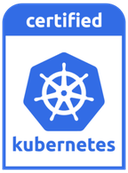mirror of
https://github.com/puppetmaster/typhoon.git
synced 2025-10-04 07:54:38 +02:00
* Add calico-ipam CRDs and RBAC permissions * Switch IPAM from host-local to calico-ipam * `calico-ipam` subnets `ippools` (defaults to pod CIDR) into `ipamblocks` (defaults to /26, but set to /24 in Typhoon) * `host-local` subnets the pod CIDR based on the node PodCIDR field (set via kube-controller-manager as /24's) * Create a custom default IPv4 IPPool to ensure the block size is kept at /24 to allow 110 pods per node (Kubernetes default) * Retaining host-local was slightly preferred, but Calico v3.6 is migrating all usage to calico-ipam. The codepath that skipped calico-ipam for KDD was removed * https://docs.projectcalico.org/v3.6/release-notes/
Typhoon 
Typhoon is a minimal and free Kubernetes distribution.
- Minimal, stable base Kubernetes distribution
- Declarative infrastructure and configuration
- Free (freedom and cost) and privacy-respecting
- Practical for labs, datacenters, and clouds
Typhoon distributes upstream Kubernetes, architectural conventions, and cluster addons, much like a GNU/Linux distribution provides the Linux kernel and userspace components.
Features 
- Kubernetes v1.13.4 (upstream, via kubernetes-incubator/bootkube)
- Single or multi-master, flannel networking
- On-cluster etcd with TLS, RBAC-enabled
- Ready for Ingress, Prometheus, Grafana, and other optional addons
Docs
Please see the official docs and the Digital Ocean tutorial.